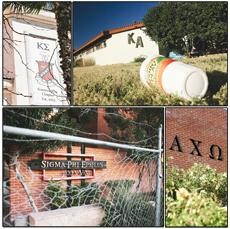The University of Arizona’s Greek Life has had a whirlwind of a semester, with several organizations losing their recognition by the university or national charters.
Some of the UA’s larger fraternities, Sigma Phi Epsilon, Kappa Sigma, Kappa Alpha Order – and Alpha Chi Omega sorority – have been removed from campus, leaving many to wonder about the future of Greek Life.
Despite the ongoing trend, many Greek Life student leaders and staff believe the removal of the chapters was the best decision for the rest of the Greek community.
“”Things tend to be cyclical within our fraternity and sorority community because we have a new group of students who enter the university every four to five years,”” director for fraternity and sorority programs Johanne Jensen said. “”With that, I think there are traditions or things that change over time that become riskier. I think that we see that, cyclically, and we have in the past decade with PIKE and Sigma Chi. Now four or five years later, we see that with other organizations and various risk-management issues.””
“”Risk management”” is an umbrella term that includes issues such as hazing and drinking violations.
Due to the constant recruiting of new members, Greek Life officials will continue educating current members about violations and risk-management issues.
“”We know that reporting has increased for (incidents,)”” Jensen added. “”Due to the increase of reporting there is more to be investigated.””
“”I don’t think the media attention that we’ve received as a community is positive; however, I think the outcome of what’s happening is positive,”” Jenson said. “”The university is saying, ‘We are about viable values-based Greek organizations.'””
She said Greek organizations are continuing to focus on the mission their chapters were founded on and working to show the UA that as a community, they will enhance the mission of the institution.
“”If a chapter cannot live up to that standard, then the university is not a home for that Greek organization,”” Jenson said.
When it came to specific fraternities that recently underwent recognition removal, several students said they saw it coming.
“”I don’t think it was a big surprise that Sigma Phi Epsilon and Kappa Sigma were removed,”” Itrafraternity Council President David Stombaugh said. “”It’s something that people have seen coming for a long time, maybe two to three years now. The events of Kappa Alpha and the decision most recently made to remove their recognition was definitely a surprise and a truly unfortunate incident.””
“”The UA has a no-tolerance policy on hazing and it’s also against Arizona state law to engage or participate in any hazing-type activity,”” Jensen said. “”That goes for any student organization on campus, or any organization in which you have to obtain membership.””
Despite the UA’s decisions to remove several chapters, the Greek community has also reintroduced several Greek organizations.
“”I am extremely excited to see Sigma Chi, Zeta Beta Tau and PIKE (Pi Kappa Alpha) on campus,”” Stombaugh said. “”All three of those chapters are some of the biggest and strongest in the country. Having them on campus and being housed on campus is great for our Greek community.””
In a recent meeting between the Center for Student Involvement and Leadership, Dean of Students and other Greek Life leadership representatives, discussions were brought up about beneficial solutions for the Greek community, Stombaugh said.
“”I think there are some real innovative things that we’re doing in our fraternity and sorority community here that a lot of other communities are not doing,”” Jensen said.
Senior coordinator for fraternity and sorority programs Jenny Nirh said she has worked to build good relationships with Residence Life as well as talking to parents and students during the new member process to help them understand what risk-management issues exist in Greek Life and how to report them.
“”As far as short-term solutions, at this point, our priority is to keep everyone safe and in good standing. There are very few chapters that are not on social probation,”” Stombaugh said. “”We have a one-strike policy when it comes to unregistered parties.””
“”As far as long-term, we have to change the types of people that we recruit,”” he said. “”The organizations that are doing well and thriving are the organizations that take the freshmen who may have initially had other ideas about joining a fraternity or sorority and over the course of four years, turn them into a more responsible, mature, hard-working, respectful individuals.””
Jensen said it’s important for each organization to stay true to their core values of scholarship, service, leadership and involvement. When any chapter refuses to live up to those core values is when they see the unfortunate consequences, such as recognition removal.
“”The mission of our Greek organizations is simply to make men better men and women better women,”” Jensen said. “”That’s their purpose and their goal.””









